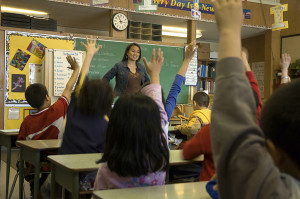By Leyden Marks
After recess, the children settled into their seats. It was time for social studies, and the youngsters (most of them, anyway) knew what to do. They had dutifully placed the appropriate text on their desks.
The teacher (holding her own copy open) instructed that they not yet open to the pages they had studied the day before. She intended to start with a review, and so she moved to the front of the room and began the lesson this way:
 “We’ve been studying about what humans need to live. Yesterday we learned about three different basic human needs. So, who here can tell me one of the things we know all people need for survival?” (Many hands shot up; some quite energetically.)
“We’ve been studying about what humans need to live. Yesterday we learned about three different basic human needs. So, who here can tell me one of the things we know all people need for survival?” (Many hands shot up; some quite energetically.)
“Yes, Nathan?” (Not using real names, of course)
“Air.”
“No, no – that’s not it. Who remembers?”
“I do,” said Lorna, having waved her hands frantically for attention.
“Water.”
“It seems you’re forgetting what we’ve been studying. Who can tell me something humans need that we studied yesterday?
(Fewer hands now.). Josh puts forth a tentative: “Food?”
“Right. Food. That’s it. And what else?”
And onward the lesson goes until the “correct answer” – food, clothing, shelter – is reached.
No kidding. This was a real event. And in a second or third grade, no less (I forget which – it’s been a long time and I witnessed it well over twenty years ago). Still, I’ve never forgotten the overall message I drew from the incident.
Air (not needed). Water (not the correct answer).
There is so much right with the children themselves here. The students respond to the teacher’s query forthrightly and likely from direct experience (perhaps insufficiently “switching gears” to recollect yesterday’s lesson?).
Just so many questions are raised by this type of lesson, though. One can question the presence of the material itself, which is hardly an easy match to most of the youngsters’ developmental or experiential levels, even if the academic understanding is grossly simplified to match reading capability. One can question the approach. One can question a teacher’s drive for “the right answer.”
What is really taught? Is it the “basic needs” drawn from sociology and “watered down” for transmitting in an elementary school classroom?
Moreover, one can wonder what children take away from even such a short exchange. What is it they really learned?

What we learn here is that the teacher is an ineffective one. All that would have been necessary to make this situation a decent learning experience would have been for the teacher to acknowledge that Nathan and Lorna were both correct in that humans all need air and water to survive. Moving on to remind the children that the object of this lesson was to recall what humans need that was described in the previous reading lesson. In this way, the teacher acknowledges that the first responses were correct, but that she was looking for some addition human survival needs described in the specific reading lesson.